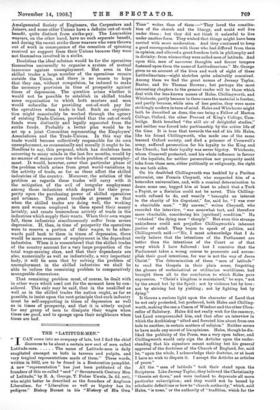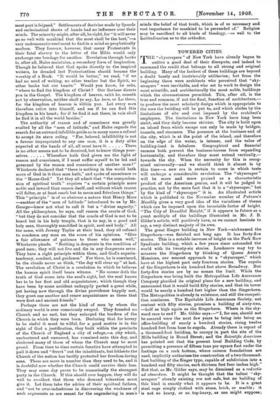THE " LATITUDE-HEN."
ir CAN come into no company of late, but I find the chief _L discourse to be about a certain new sect of men called Latitude-men. . . . The name of Latitude-men is daily exagitated amongst us both in taverns and pulpits, and very tragical representations made of them." These words, written in 1662, are to be found in a Restoration pamphlet. A new " representation " has just been published of the founders-of this so-called "sect" (" Seventeenth Century Men of Latitude," by E. A. George, T. Fisher Unwin, Se. 6d. net), who might better be described as the founders of Anglican Liberalism, for " Liberalism as well as bigotry has its pedigree." Bishop Burnet in his "History of His Own Time " writes thus of them :—" They loved the constitu- tion of the church and the liturgy, and could well live
under. them : but they did not think it unlawful to live
under another form. They wished that things might have been carried with more moderation. And they continued to keep
a good correspondence with those who had differed from them
in opinion, and allowed a great freedom both in philosophy and in divinity: from whence they were called men of latitude. And
upon this, men of narrower thoughts and fiercer tempers fastened upon them the name of Latitudinarians." Mr. George gives us an account of the lives and work of eight of these Latitudinarians,—eight sketches quite admirably conceived.
Among them we find the great names of Jeremy Taylor, Baxter, and Sir Thomas Browne ; but perhaps the most interesting chapters to the general reader will be those which deal with the less-known names of Hales, Chillingworth, and Whichcote, partly because in these cases the material is fresher, and partly because, while nien of less genius, they were more strikingly modern in turn of mind. Hales and Whic hcote might both be described as dons, the one being a Fellow of Merton College, Oxford, the other Provost of King's College, Cam-
bridge. Both breathed "the still air of delightful studies," and neither was forced into partisanship by the active life of
the time. It is true that towards the end of his life Hales, like his friend Chillingworth, who made one of the same learned Oxford society, and died a prisoner of Cromwell's army, suffered persecution for his loyalty to the King and the Church ; but their loyalty was never bigotry. Whichcote, whom Cromwell protected, used his whole influence in favour of the loyalists, for neither persecution nor prosperity could take from these men, either politically or religiously, the right to see both sides.
On his deathbed Chillingworth was heckled by a Puritan extremist, one Francis Cheynell, who suspected him of a heterodox universalism, and, with a comical determination to damn some one, begged him at least to admit that a Turk a Papist, or a Socinian could not be saved. This Chilling- worth refused to do, and wearily " besought an interest in the charity of his disputant," for, said he, "I was ever a charitable man." "My answer," writes Cheynell, who recorded the interview, " was somewhat tart, and therefore
more charitable, considering his [spiritual] condition." He " rebuked" the dying man " sharply." But even this strange
unkindness could not prejudice Chillingworth's inherent justice of mind. They began to speak of politics, and Chillingworth said :—" Sir, I must acknowledge that I do verily believe that the intentions of the Parliament are
better than the intentions of the Court or of that army which I have followed : bub I conceive that the
Parliament takes a wrong course to prosecute and accom- plish their good intentions, for war is not the way of Jesus Christ." The determination of these " men of latitude" to read the Gospels in their plain sense, forgetting the glosses of ecclesiastical or utilitarian worldliness, had brought them all to the conclusion to which Hales gave expression. "Christ's kingdom is maintained," he says, "not by the sword but by the Spirit: not by violence but by love : not by striving but by yielding ; not by fighting but by dying."
It throws a curious light upon the character of Land that he not only protected, but preferred, both Hales and Chilling- worth, making the one a Canon of Windsor and the other Chan- cellor of Salisbury. Hales did not really wish for the canonry, but Laud overpersuaded him, and that after an interview in which the Archbishop " sifted and ferreted him about from one hole to another, in certain matters of religion." Neither seems to have made any secret of his opinions. Hales, though he dis- liked the publicity of the Press, was a very open talker, and Chillingworth would only sign the Articles upon the under-
standing that his signature meant nothing but his general approval of the doctrines of the Church of England, for, said be, " upon the whole, I acknowledge their doctrine, or at least I have no wish to dispute it. I accept the Articles as articles of peace."
All the " men of latitude " took their stand upon the Scriptures. Like Jeremy Taylor, they believed the Christianity
"therein set down," and were inclined to deprecate all more particular subscription ; and they would not be bound by scholastic definitions or bow to "church authority," which, said Hales, "is none," or the authority of "tradition, which for the
most part is feigned." Settlements of doctrine made by Synods and ecclesiastical shows of bands had no influence over their minds. The minority might, after all, be right, for" it will never go so well with mankind that the most shall be the best,"—a very undemocratic sentiment to find in a mind so prophetically modern. They foresaw, however, that many Protestants in their fatal slavery to the letter of the Bible would only exchange one bondage for another. Revelation through books is, after all, Hales maintains, a secondary form of inspiration. Though he believed that God spoke directly to the inspired writers, be dreaded lest Protestantism should become the worship of a Book. "It would be better," we read, "if we had no need of writing, no other teacher but the Spirit, no other books but our hearts." Would you know, he asks, " where to find the kingdom of Christ ? Our Saviour directs you in the Gospel. The kingdom of heaven, saith he, cometh not by observation, neither shall ye say, Lo here, or Lo there, for the kingdom of heaven is within you. Let every man therefore retire into himself, and see if he can find this kingdom in his heart ; for if he find it not there, in vain shall be find it in all the world besides."
The authority of reason and of conscience was greatly exalted by all the "men of latitude," and Hales regards the search for an outward infallible guide as in many cases a refusal to accept its stern ruling. " For, beloved, infallibility is not a favour impropriated to any one man, it is a duty alike .expected at the hands of all, all must have it There is no other means not to be deceived, but to know things your- selves Wherefore bath God given me the light of reason and conscience, if I must suffer myself to be led and governed by the reason and conscience of another man ?" Whichcote declared that "there is nothing in the world hath more of God in it than man hath," and spoke of conscience as the " Home-God." Yet they all admit that " the comprehen- sion of spiritual truth " requires " a certain principle more noble and inward than reason itself, and without which reason will falter, or at least reach but to mean and frivolous things." This " principle " is of so abstruse a nature that Henry More —another of the "men of latitude" introduced to us by Mr. George—knew not what to call it but a " divine sagacity." All the philosophers, he says, call reason the oracle of God, " but they do not consider that the oracle of God is not to be heard but in his holy temple, that is to say, in a good and holy man, thoroughly sanctified in spirit, soul and body." All the same, with Jeremy Taylor at their head, they all refused to condemn any man on the score of his opinions. "Give a fair allowance of patience to those who mean well," Whichcote pleads. "Nothing is desperate in the condition of good men; they will not live and die in any dangerous error. They have a right principle within them, and God's superin- tendency, conduct, and guidance." For them, be is convinced, be the clouds never so thick, "the day will clear up" at last. The revelation of Christ is a revelation to which be believes the human spirit itself bears witness. " No sooner doth the truth of God come into the soul's sight, but the soul knows her to be her first and old acquaintance; which though they have been by some accident unhappily parted a great while, yet having now through the divine providence happily met, they greet one another and renew acquaintance as those that were first and ancient friends."
Perhaps these are not the kind of men by whom the ordinary world is ever consciously swayed. They founded no Church and no sect, but they enlarged the borders of the Church in which they were born. Declaring that for heresy to be sinful it must be wilful, for a good motive is in the sight of God a justification, they built within the precincts of the Church of England a city of refuge,—a city which, unchartered and unnamed, has remained unto this day, and sheltered many of those of whom the Church may be most proud. From time to time certain fanatics have attempted to pull it down and " ferret " out the inhabitants, but hitherto the Church of the nation has tacitly protected her freedom-loving sons. These are more in number than they used to be, and it is doubtful now whether the Church could survive their loss. They may some day prove to be numerically the strongest party in the Church. If this should ever happen, they will do well to recollect that those who demand toleration must give it. Let them take the advice of their spiritual fathers, and "not be over-industrious in discovering the weakness of such arguments as are meant for the engendering in men's minds the belief of that truth, which is of so necessary and vast importance for mankind to be persuaded of." Religion may be sacrificed to all kinds of theology,—as well to the Latitudinarian as to the orthodox.











































 Previous page
Previous page